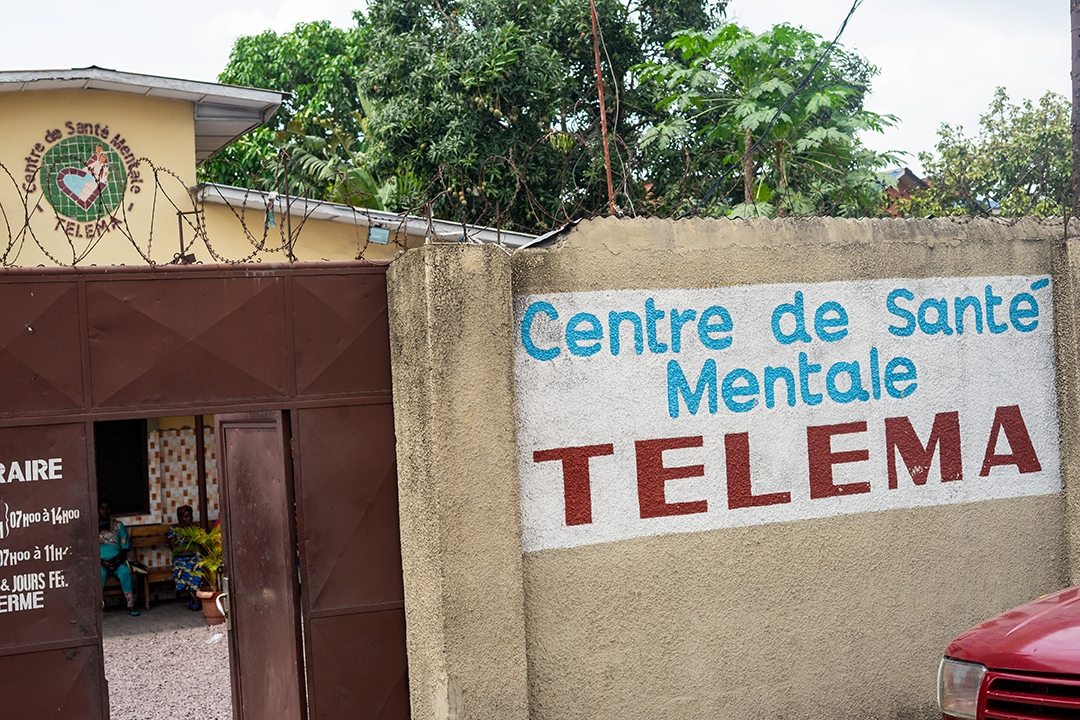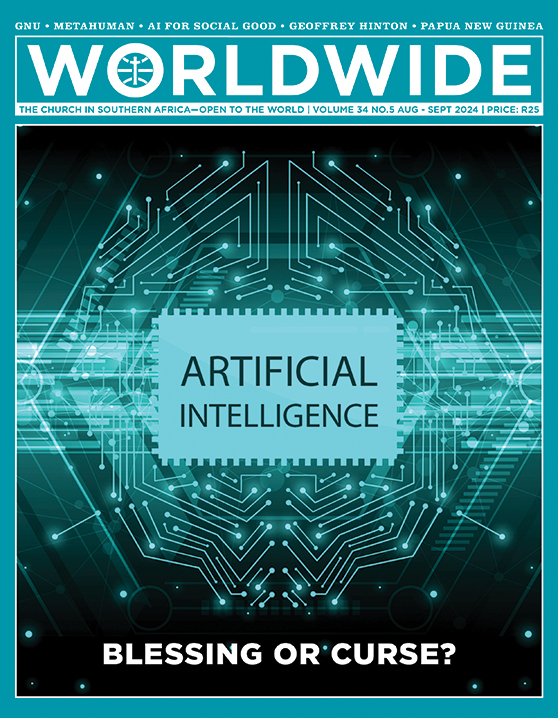
ARTIFICIAL INTELLIGENCE: BLESSING OR CURSE?
The image, according to Chat GPT, features the phrase “ARTIFICIAL INTELLIGENCE” at its centre, overlaid on a stylized depiction of a microchip and circuitry. This design symbolizes the integration of advanced AI technologies within modern electronic systems, emphasizing the critical role of AI in driving technological innovation and enhancing computational capabilities across various industries.
FRONTIERS • PAPUA NEW GUINEA
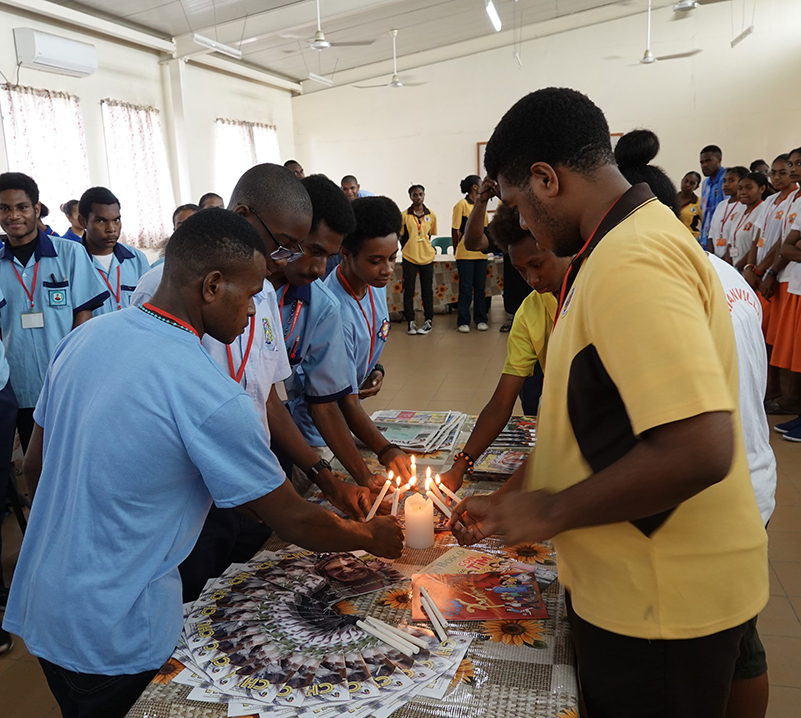
UNDERSTANDING ARTIFICIAL INTELLIGENCE
Artificial intelligence and digitalization are transforming the lives of the people, especially the youth, in Papua New Guinea. The author, a Salesian missionary, explores the opportunities and challenges of these new tools amidst the dwellers of this remote Melanesian Island country.
BY FR AMBROSE PEREIRA SDB | TEACHER OF CHRISTIAN LIVING AT DON BOSCO TECHNICAL SCHOOL, GABUTU, PORT MORESBY, PAPUA NEW GUINEA
COUNTRIES FROM the Americas, Asia, Australia, and New Zealand are nestled on the so-called ‘Ring of Fire’. Among them, in the South Pacific, is Papua New Guinea, one of five Melanesian countries. The Ring of Fire is formed by tectonic plates that rub against each other, releasing seismic activity which manifests in earthquakes, tremors, and volcanic eruptions. Challenges do exist, but living in these parts of the world is a constant reminder of the wonder and beauty of nature, as seen in the marvelous landscapes with their unique flora and fauna. They also boast the ‘Bird of Paradise’ present only in Papua New Guinea and some parts of Indonesia and Northern Australia.
This country, blessed with such an abundance of resources, hosts nearly 1000 tribes and an equal number of languages. Papua New Guinea has made a huge leap from the stone age to modern times. This jump sometimes causes people to struggle with discipline and a certain routine—necessary in modern times—which stems from following the ‘rhythm of life’. Papua New Guinea now stands on the brink of technology, with its immense possibilities of communication, access to information, scientific knowledge made possible only because of the dawn of the ‘Digital Age’, and the fast-developing Artificial Intelligence (AI). Let’s dwell on the Melanesian people, their grasp of and involvement with AI, and offer a few tips to safeguard them as we navigate the nuances of AI.
Digitalization in Papua New Guinea
Papua New Guinea has the highest population of all the countries in the South Pacific. While the country delayed its census due to several factors, the 2011 statistics stated that of its nearly 8 million inhabitants, 87% lived in rural areas, in mountainous and challenging terrains, which makes the laying out of infrastructure necessary for steady electrical supply and internet penetration very difficult. Gradually, 3G and 4G coverage is increasing, giving rural communities the possibility of a mobile signal. However, the cost involved could be among the highest in the world. The digital data report of 2024 states that a little over 10% of the population has social media connectivity.
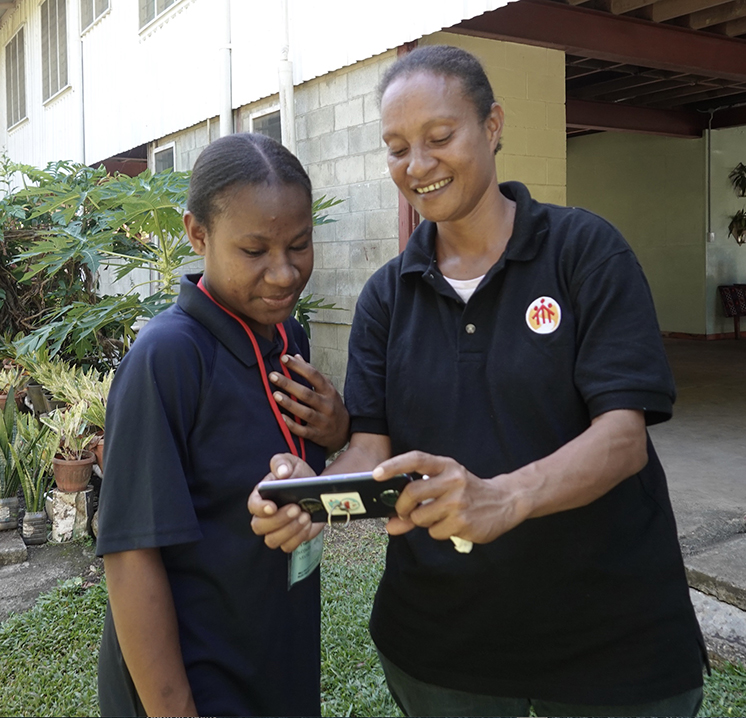
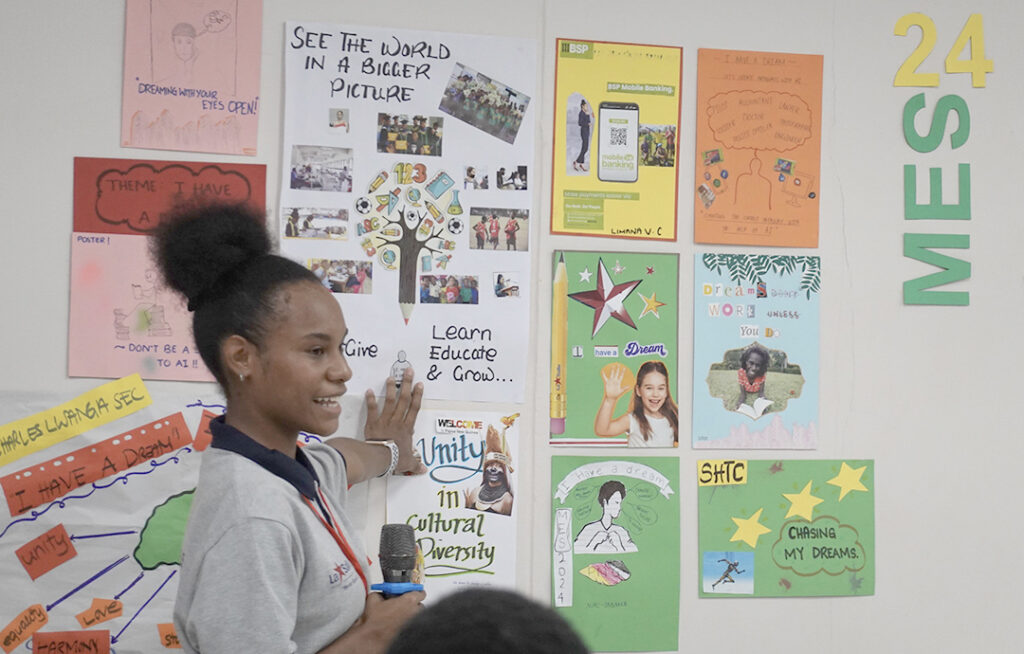
The Melanesian people have missed out on the ‘Rhythm of Life.’ Waking up early every morning and getting to school daily, five days a week throughout the year is not an easy task for them. There are many factors that hamper this kind of routine, among them the weather, natural disasters, or even man-made disasters. “You are capable of much,” I would constantly remind our students. Despite the limitations and the challenges, students at educational institutes and universities who are disciplined and determined are capable of great strides in life.
Several digital natives have been using AI tools and ChatGPT for mundane tasks like taking minutes, scheduling reminders, and data entry. Thus, they are free to spend time in creative and value-added activities. Some students at school and at higher educational institutes use AI to get their class assignments done. “This is making them lazy. They do not want to read, and they lack comprehension,” said Sr. Freida Saura OLSH, principal of Marianville Catholic Secondary School, Bomana. She laments the fact that the students lack the energy to get things done. “They take the easy way out as they think that it is too challenging for them,” she said.
Use of AI Programs
“Artificial Intelligence is a human creation of an ‘intelligent’ being that responds to a ‘computer programming language’. It is a ‘being’ that does not have the nature of a person and hence the term ‘artificial’,” explains Luis Marampau, Computer instructor at Marianville Secondary School. “AI has no emotion nor feelings and cannot exert any harmful force unless programmed or commanded by a human person,” he continues.
Papua New Guinea has made a huge leap from the stone age to modern times.
As a teacher, you have your ‘human intelligence’ to rely on. Identifying students who have used AI in their assignments is not difficult. This is obvious from the fact that their language and performance in class do not correspond to the assignment presented. I was surprised to get a few essays that used uncommon words. Ideas not mentioned in class were featured, and the construction of the sentences was complex. This raised the alarm about AI and so I approached them and asked which programs they were using.
So, why do the students use AI tools to do their class assignments? Here are some of the reasons: Some of them lack confidence and are unable to understand what to write about; several of them have time constraints as they are busy with games, entertainment, or just do not have enough time to study; but the main reason could be that they are unable to see the relevance of the assignment. It somehow does not relate to their lives. It is now the task of our instructors and teachers to ensure that every assignment is grounded in their situation and connected to the reality of their lives. More importantly, ensuring that every task is inspiring and has a positive effect on their lives.
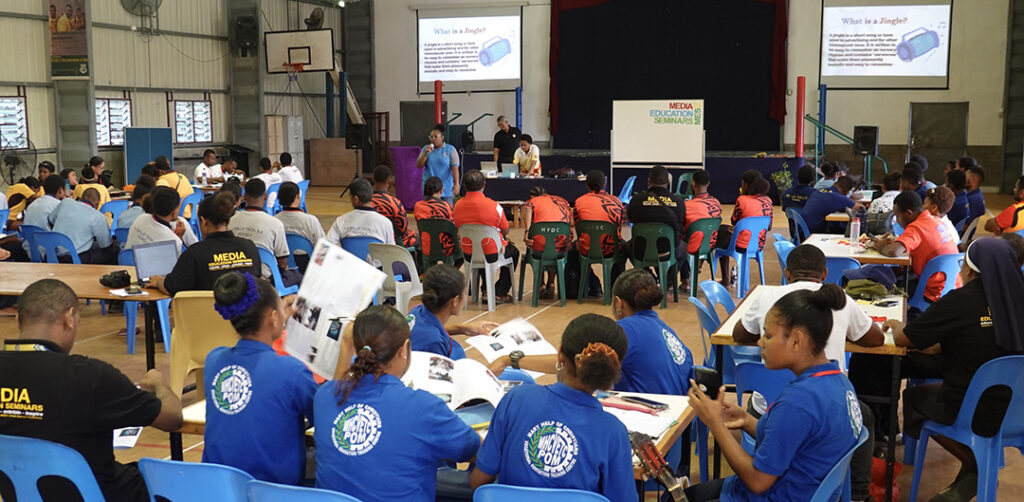
Familiar with AI, Fr. Sylvester Kuli SDB, Spiritual Moderator at Don Bosco Technological Institute in Boroko, said: “I was delighted when ChatGPT gave me a 5-minute stage play on the life of Blessed Peter ToRot. After critically going through it and touching up the script, I presented it to a group of students who were ready to stage it at the morning assembly on the feast day of Bl. Peter ToRot.” “I am also aware that several students are using ChatGPT for their assignments. I caution them and invite them to develop their critical thinking, redo their assignment, and insert their personal reflections,” he said. “AI is good as it can help us get started on a project. Then comes the search for errors and the critical appreciation,” he added.
Being Aware of the Potential Dangers
We need to safeguard people from the risks and dangers of AI:
Talk about the Ethics of AI: Drawing from our own experience, we need to discuss AI. “Explain to our young people the benefits and the beauty of AI as well as the negative aspects of being hooked on AI,” said Sr. Carmina FMA, instructor at the Salesian Sisters Vocational and FODE (Flexible Open and Distance Education) centre. It is essential that young people and digital natives have sessions about AI. There can be no AI without dealing with its ethics.
Guide on Issues of Safety, Privacy, Bias, and Bullying: “There need to be regular seminars and programs in schools and youth groups on AI and its ethical issues,” said Patrina Kaboanga, media instructor at Don Bosco Technological Institute, Boroko. “Explore the real world and investigate how AI is used in everyday life,” said Lucy Napitalai, Media animator.
“There need to be regular seminars and programs in schools and youth groups on AI and its ethical issues”
Try AI Together: Teenagers are using AI on a regular basis, yet only one in five parents understand and use AI. It is essential that parents and children work on AI platforms together. Our young people are differently wired. They can understand and use technology for the advantage of all. The ‘digital immigrants’ must be ready to learn from the ‘digital natives.’ “You are old-fashioned,” said the teenage daughter to her mother who was struggling with her smartphone. Parents and adults must request their children to teach them the finer details of digital devices and AI. Adults need to explain to their children the aspects of privacy and ethics relevant to life.
Challenge Your Kids to Think Creatively and Critically: Encourage creative and critical thinking. AI can give us an outline to work on. AI is devoid of any emotion. It cannot take on the job of a doctor, script writer, counsellor, artist, news writer, journalist, etc. It cannot pick up emotions, body language, or bias in content. Encourage your children and students to be creative and critical when they use AI.
We need to constantly update our teachers and parents in the use of technology to enable them to guide children into recognizing what is good and right. This should be our constant reminder to our parents and teachers. AI is developing at an unthinkable pace. It is now up to each one of us to understand it and strive to ensure that humankind benefits from it, working together, not as foes, but as friends.

